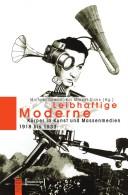| Listing 1 - 2 of 2 |
Sort by
|

ISBN: 3839402883 3899422880 Year: 2015 Publisher: Bielefeld transcript Verlag
Abstract | Keywords | Export | Availability | Bookmark
 Loading...
Loading...Choose an application
- Reference Manager
- EndNote
- RefWorks (Direct export to RefWorks)
Nach 1918 stützen sich zahlreiche Versuche, einen Begriff von der »Moderne« zu entwickeln, auf die Zuweisung neuer Sinnpotenziale an den Körper. In der Lebensreformbewegung wird der Körper zum Inbegriff von Natürlichkeit, der Wettkampfsport richtet ihn am Kriterium der Effizienz aus, und die entstehende Modeindustrie macht den Leib zur Ware. Die Kunst und die neuen Massenmedien bieten diesen Positionen ideale Foren zur Austragung ihres symbolischen Streits. Der bebilderte, umfangreiche Band führt die wesentlichen Körperkonstrukte der zwanziger Jahre erstmals zusammen und analysiert sie vom Maschinenmensch über die FKK-Ästhetik und den Mannequin-Körper bis zum Ausdruckstanz in mehr als 20 Ausprägungen. »[This] collection of essays, five of which are in English, will surely benefit any scholar working in the quickly expanding field of body studies, and the admirably interdisciplinary nature of this volume means that it should be on the bookshelf of anyone who studies art, film, fashion, dance, sports, or the FKK movement in Weimar Germany.« Erik Jensen, German Studies Review, 2 (2007) Besprochen in: Kulturwissenschaftliches Jahrbuch Moderne, 2 (2006), Stefanie Rinke
Sociology --- Arts. --- Cultural History. --- Cultural Studies. --- Media. --- Popular Art. --- Human figure in art --- Body image in art --- Arts, German --- social aspects --- Human body in art --- Art --- Composition (Art) --- Figurative art --- Anatomy, Artistic --- Figure drawing --- Figure painting --- Körper; Kunst; Medien; Weimarer Republik; Kulturgeschichte; Populäre Kunst; Kulturwissenschaft; Body; Arts; Media; Cultural History; Popular Art; Cultural Studies --- Human body in mass media --- Mass media --- History
Book

ISBN: 3110297116 1283857375 3110297108 3110296942 9783110297102 9783110296945 9783110297119 Year: 2012 Publisher: Berlin Boston
Abstract | Keywords | Export | Availability | Bookmark
 Loading...
Loading...Choose an application
- Reference Manager
- EndNote
- RefWorks (Direct export to RefWorks)
At times of crisis and revolution such as ours, diagnoses of crucial junctures and ruptures - 'turning points' - in the continuous flow of history are more prevalent than ever. Analysing literary, cinematic and other narratives, the volume seeks to understand the meanings conveyed by different concepts of turning points, the alternative concepts to which they are opposed when used to explain historical change, and those contexts in which they are unmasked as false and over-simplifying constructions. Literature and film in particular stress the importance of turning points as a sensemaking device (as part of a character's or a community's cultural memory), while at the same time unfolding the constructive and hence relative character of turning points. Offering complex reflections on the notion of turning points, literary and filmic narratives are thus of particular interest to the present volume.
Change in literature. --- Mass media and history. --- Social change in literature. --- Change in literature --- Mass media and history --- Social change in literature --- Languages & Literatures --- Literature - General --- History and mass media --- History --- E-books --- Changement social --- Médias et littérature. --- Dans la littérature. --- Time. --- narratology.
| Listing 1 - 2 of 2 |
Sort by
|

 Search
Search Feedback
Feedback About UniCat
About UniCat  Help
Help News
News